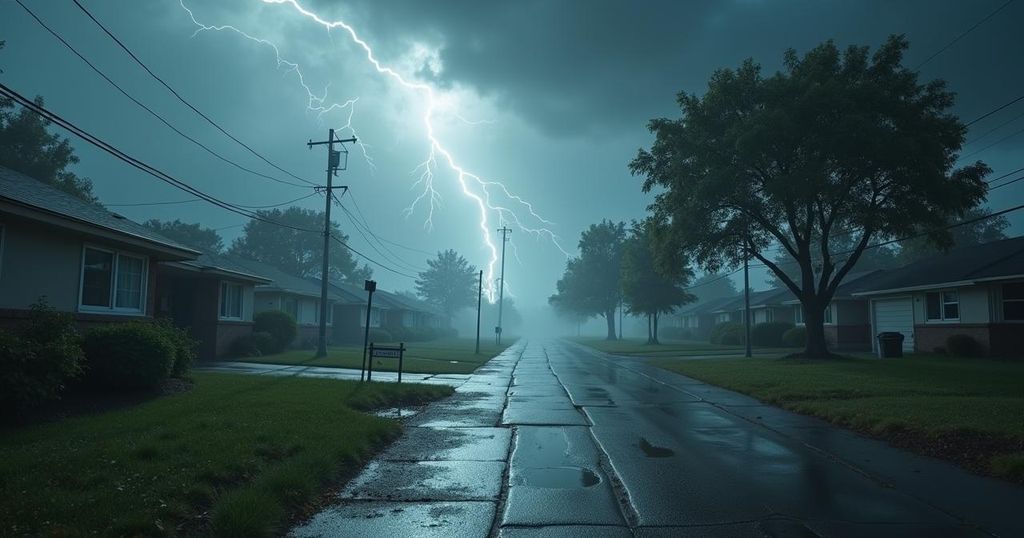Recent hurricanes Milton and Helene reveal climate change as a critical national security threat, surpassing traditional concerns like terrorism. The Pentagon acknowledges climate change’s urgency, with Secretary of Defense Lloyd Austin labeling it existential. Historical perspectives advocate for a redefinition of national security to ensure the protection of American lives from such disasters, necessitating proactive measures and planning.
The recent destructive hurricanes, Milton and Helene, have drawn attention to the critical issue of climate change as a serious national security threat, one that poses greater risks to American lives than conventional adversaries such as terrorist groups or authoritarian governments. Hurricane Milton has wreaked havoc in Florida, with climate scientists affirming that warming ocean temperatures intensify the severity of such storms. Similarly, Hurricane Helene, which struck just two weeks prior, inflicted serious damage on communities such as Asheville, North Carolina, located far inland, and resulted in the loss of at least 232 lives. In light of these realities, it is imperative to view climate change not merely as an environmental concern but as a pressing national security issue. This perspective is not confined to partisan ideologies; the Pentagon has acknowledged climate change’s status as a significant threat and has prioritized it in its strategic assessments. U.S. Secretary of Defense Lloyd Austin has articulated this sentiment, specifically stressing, “We face all kinds of threats in our line of work, but few of them truly deserve to be called existential. The climate crisis does.” This evolving recognition has significant implications for critical U.S. Navy installations situated in low-lying areas like Norfolk and Virginia Beach, which are increasingly vulnerable to rising sea levels attributed to climate change. Furthermore, the exacerbation of conflicts globally due to climate-induced migration, such as the crisis in Sudan, underscores the interconnectedness of security challenges and the potential for climate change to ignite further instability. Historically, the ideology of national security has shifted; President Franklin Delano Roosevelt possessed a more expansive vision encompassing the fundamental security of American citizens. He emphasized the importance of “freedom from want,” advocating for global economic structures that promote peace and prosperity. However, the framing of national security evolved during the Cold War and subsequent conflicts, ultimately prioritizing defense against external threats. This misalignment continues to influence security policy to this day. As highlighted by the COVID-19 pandemic, which claimed the lives of approximately 1.2 million Americans, health crises must also be integrated into national security discussions. Words from the non-partisan COVID Crisis Group suggest that the U.S. remains inadequately equipped to confront forthcoming pandemics. As we reflect upon the destructive impact of hurricanes Milton and Helene, the pressing question arises: Are we genuinely safer from threats like climate change and pandemics? If the answer is negative, it is imperative for policymakers to engage in a comprehensive and informed dialogue regarding the evolving definition of national security, particularly in terms of preventive measures to mitigate the adverse effects of climate change, such as the restriction of new developments in flood-prone areas.
The article underscores the urgent reality of climate change as a national security threat exacerbated by recent hurricanes. Climate scientists attribute the increased intensity of hurricanes to warming oceans, which raises the stakes not only for immediate disaster response but also for long-term policy formulations. The quote from Secretary of Defense Lloyd Austin emphasizes the Pentagon’s recognition of climate change as an existential threat and aligns with the historical perspective of national security as articulated by President Franklin D. Roosevelt. This broader view remains pertinent today amidst contemporary challenges, including the ongoing risk of pandemics and global conflicts linked to climate-induced migration.
In summary, the severe impacts of Hurricanes Milton and Helene illustrate the urgent need to reconceptualize national security to include climate change as a significant threat. As historical perspectives demonstrate, true national security entails safeguarding the welfare of American citizens. The time has come for politicians and policymakers to initiate substantive discussions on these existential threats and implement strategic measures to address them. Without this shift in understanding, society remains perilously unprepared for future crises.
Original Source: amp.cnn.com






